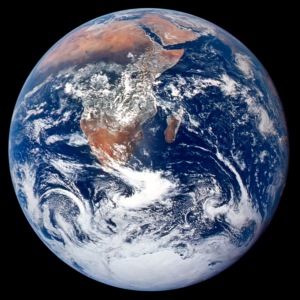I like to imagine a first-contact conversation between humans and aliens. I think the aliens might have a lot of questions for us, and some of them might go like this:
71% of your planet is covered with water, and yet you named it “earth?”
I think this question should really be asked. But more than the question of why we named our planet after dirt, we should ask ourselves why we have ignored the vast majority of its surface: the oceans. We have explored so little of the water on our planet, and we treat it like a toilet. That’s a shame, because there is amazing bio-diversity in our oceans.
Why are you continually fighting among yourselves instead of improving the lives of your people?
The United States spends hundreds of billions of dollars on its military, but for good reason: we have assumed the role of the world’s constable. But many questions have been raised about whether we should have such a military presence all around the world. It makes sense that there is a significant footprint in South Korea, with the North Korean dictator performing nuclear tests just on the other side of the DMZ. But what if we drew back our forces just a little bit? What if one percent of the military budget could be spent on education or health care? (The math for “Medicare for All” made my head hurt, so I had to stop).
Why is maximizing profit more important than health and safety?
Okay, this would not actually be something aliens would care about. But corporations are notorious for cutting corners to maximize profits, often to the detriment of the workers’ safety. (I learned more about mine safety than I wish I had.)
Explain what you mean by “justice.”
Over the years I have become quite cynical, and I have replaced the word “justice” in certain contexts with “retribution” or “punishment”. Our “justice” system has no interest in righting wrongs, which I think is the ideal. Instead, people who want to see justice delivered are really interested in an “eye-for-an-eye” payback solution to appease their outrage. Many people are locked away to be changed into people they would never have become otherwise. They are removed from our society because they seem to be monsters beyond redemption. I have ceased to believe in the concept of justice, especially on a cosmic scale. That is too intense a topic for this post.
Why can’t everyone get an education?
The actual question will be, “why is not everyone well-informed?” And I don’t have a good answer to that.
Why do you deliberately make yourselves unhealthy?
Again, I do not have an answer.
Why do you create objects intended to be thrown away?
Why are some sounds you make forbidden?
This is going to be tough to explain because people on this planet can’t agree. My friends in Europe have totally different attitudes regarding profanity than we in the States appear to. For some reason Americans are very sensitive to certain words, so much that we have labels like “profanity”, or “swearing”, to name just a couple. I can remember a time when the word “damn” was forbidden on television. I think you couldn’t use the word “pregnant” at all in society for some time. “Obscenities” are in the ear of the receiver; I still cringe when I hear my British friends use “cunt” casually in a sentence.
What do you plan to do with planets you eventually visit?
This is a good question, especially when you consider what we’ve done with this planet.
I believe I will see humans on Mars in my lifetime. I look forward to the sight, and I think humanity will benefit from further exploration of our solar system and beyond. I don’t know if there really is intelligent life beyond our planet, but we are discovering more and more planets orbiting other stars in our galaxy. Perhaps one of them supports life we might recognize as intelligent. But realistically, there are vast distances between stars, and travel between them is inconceivable to say the least, for us. Maybe someday, as Carl Sagan optimistically predicted, we will reach the stars.
